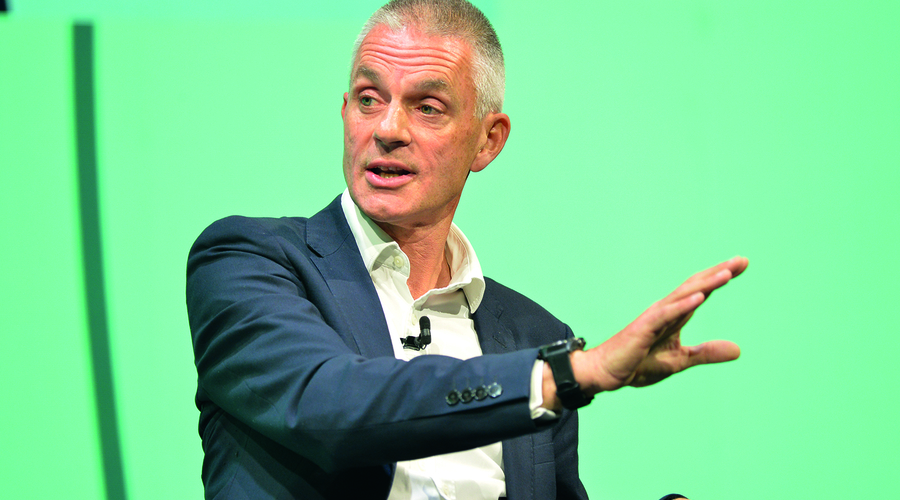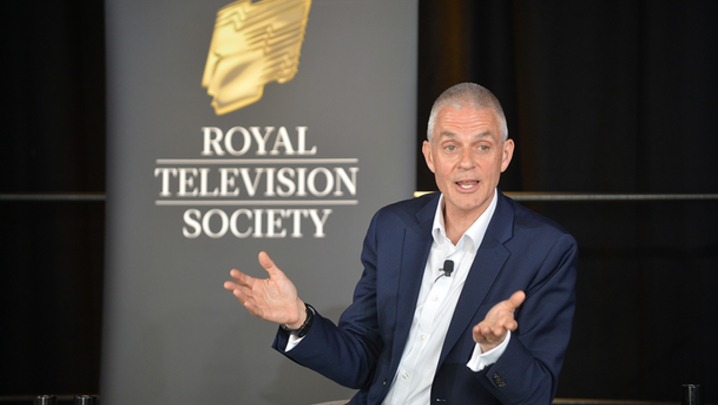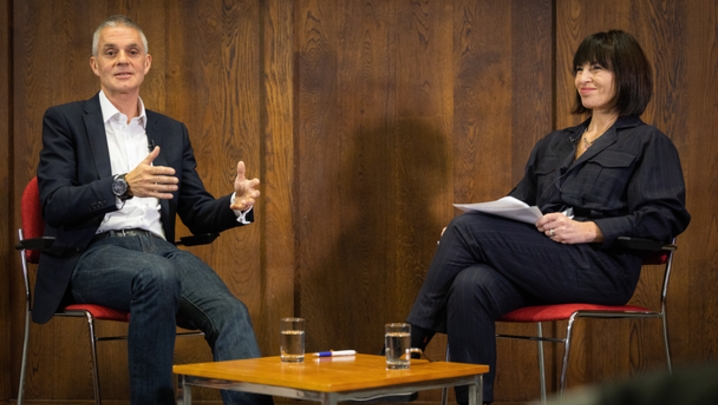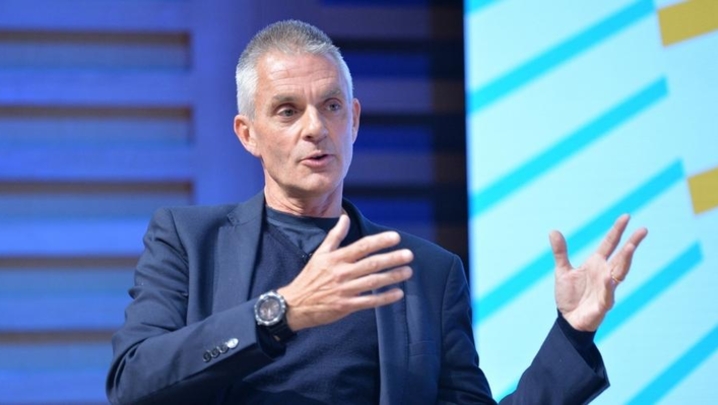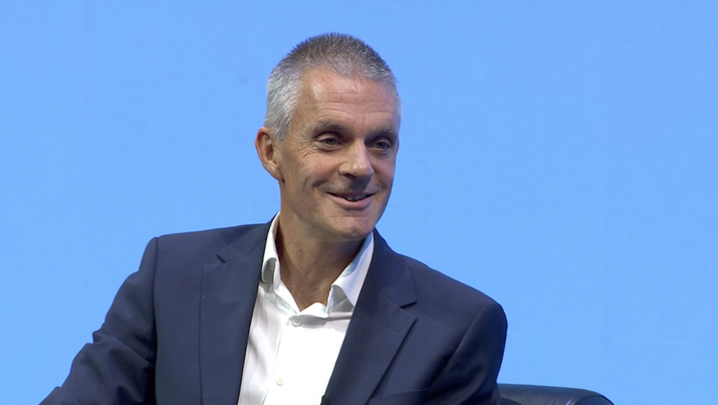The BBC Director-General discusses why the UK needs to be a cultural superpower – and the fallout from the allegations against Russell Brand
Another week, another BBC media storm. As allegations of rape and other forms of sexual abuse emerged against Russell Brand, a former Radio 2 and Radio 6 Music presenter who resigned in 2008 following a prank phone call to actor Andrew Sachs, the BBC’s Director-General, Tim Davie, once again found himself having to defend the corporation’s culture.
Two days before his Cambridge appearance, the DG had announced that an internal inquiry would examine any complaints made about Brand during his time at the BBC. “This is not an issue that we can put down as wholly historic. There is an important and healthy dialogue to have around these deep imbalances of power,” he said.
“High-adrenaline environments”, be it TV and radio production or City trading rooms or even hospital operating theatres all appeared to be breeding grounds for sexual predators, he continued. It was essential that the BBC had a “flawless whistle-blowing process” and “very, very rigorous support systems” for staff who were affected; trust in internal processes was vital.
“There have been problems, deep problems with misogyny, abuse of power.… We have to be utterly vigilant and unaccepting of it.… and trust that, when information is brought forward, it is treated very seriously. Our record recently has been very transparent.…There’s never a sense that we want to cover it up.”
But was enough done back in 2008, when the so-called Sachsgate incident occurred? This, coincidentally, was a few weeks after Davie began work as the BBC’s Head of Audio. “With hindsight, you can always reflect on whether there were things we could have looked at,” he replied. “We did a good job on that review.”
The DG added: “I am proud of our culture. When I go around the BBC, we are having profound conversations and we have been for years. [But] are we getting it right in ensuring there are no abuses of power and that people behave flawlessly in terms of respect for each other, and kindness?”
Davie’s interviewer, business journalist Kate Bulkley, pressed him on the fact that there was also an investigation into allegations of sexual misconduct against newsreader Huw Edwards.
“That’s why I say you can’t be complacent,” responded Davie. “We’ve got to be careful we don’t prejudge all these investigations. I say that with caution because my instinct is that there are significant problems. What I’ve seen is significant progress.”
Turning to the wider subject of future-proofing the BBC at a time of what feels like permanent disruption, Davie highlighted the announcement of Freely, the new broadband-delivered streaming service from Everyone TV (formerly Digital UK), due to launch in the New Year.
Was the service aimed at ensuring that PSBs have prominence in an online world? “Prominence is critical,” agreed Davie. “We’re at a critical point on public service broadcasting where we have to choose and intervene and ask, ‘What are we going to create, based on the environment we’ve heard brilliantly articulated this morning, [where young people have no loyalty to the BBC]?’
He continued: “The simple thing about Freely is we know that, by about 2030, most people will be using the internet as their primary connection. It’s probably about 15% now… I think we’re miles away from any kind of switchover.” Davie wanted to make sure that households “who are less attuned to digital change” aren’t left behind. Hence Freely, which aims to be “a flawless platform providing live television, catch-up TV and SVoD”.
He added: “Freely’s got a really good chance because it’s got all the public service broadcasters together.… I think this is going to be a fight. You’re never going to own the whole market. Loads of people want to own the front of your television. Having our public service broadcasters as one player in the game for a big section of society is well worth investing in.”
Davie urged the Government to get on with its Media Bill. He emphasised that it was the BBC’s role to chase the audience and not the market by backing distinctive programmes such as Happy Valley and Wild Isles, two of the most popular shows of the past year. He was pleased with how much BBC drama was being watched online, singling out The Sixth Commandment.
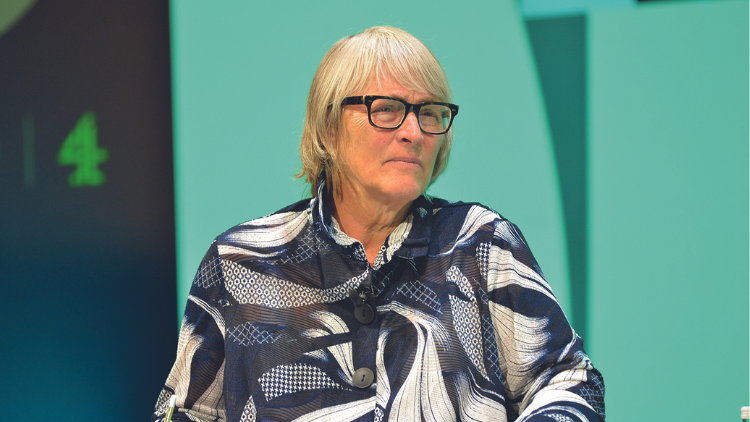
Regarding his “value for all” strategy, Davie listed four priorities: get the content right; ensure “you are joined up and using online flawlessly”; maintaining impartiality in the face of enormous pressure; and correct use of the BBC’s commercial income.
As for future strategy, said the DG, the world was moving so fast, the BBC had its thinking cap on. One concern was safeguarding the prominence and delivery of public service news. He explained: “The BBC has a rich heritage of innovation… we’ve got to make some choices about how we innovate to stay relevant.… The biggest choice is where your editorial focus is.”
Would this involve more cuts? It seemed not: “We’ve made some changes in local radio and cut the budget and migrated money into digital services. That was the right decision [although] it’s been incredibly difficult.”
On the commercial front, Davie said the BBC had to ensure that BBC Studios’ content supply was “absolutely vibrant”.
What, though, was the future of the licence fee? Surely, it was a busted flush, suggested Bulkley. “Funding models are absolutely secondary,” Davie said. “As a board, we’ve set out very clear principles. We believe in universal funding. We believe in the independence of the BBC. I don’t believe you can separate the funding mechanism from the editorial content.
We will double commercial revenues in the next few years... we have done it before
“If we move to a radically different funding model [a review of the licence fee is underway at DCMS], our backing is for a universal service that preserves our independence. I think the mechanics of that are secondary. The licence fee works well at the moment.”
With media inflation showing no sign of abating, Davie said the BBC needed capital and investment. Growing the BBC’s commercial activities was therefore essential. Acquiring more stakes in indies was not ruled out. “ITV Studios, BBC Studios should be incredibly proud. Where would those businesses be if UK entities had not worked with them as creative partners?”
The BBC’s commercial revenues had doubled in recent years. There was no reason why “we can’t do that again”. On-demand services in the US were being looked at. There was enormous potential. “We’re not trying to take over the world, but do good things.”
He was “healthily paranoid” regarding Netflix taking BBC talent. “Life is not just about the cash. Surely, it’s about what our legacy is.… In some ways, the biggest achievement is to get the top people in the industry working at the BBC. I’ve got a battle on my hands to keep talent. One of the areas I’m working on is people who are brilliant at engineering code.”
The BBC didn’t need all of people’s time but if it was habitually where people go for trusted content, it would be fulfilling its purpose, but he conceded that the BBC and all the UK PSBs were “in a massive fight for relevance”.
Were the culture secretary to grant him one wish, what would it be? To have a growth plan for the creative industries. “There is enormous growth to be had,” said Davie. “We can generate economic growth that has a cultural and social return.”
In Session Two of the Too Much To Watch convention: ‘UK keynote: Tim Davie’, the BBC Director-General was in conversation with journalist Kate Bulkley. The session was produced by Sue Robertson.

